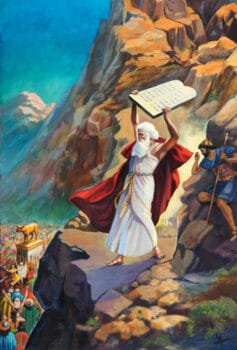Daily Lesson for Wednesday 10th of September 2025
Read Exodus 32:9-29. What was Moses’ reaction to God’s threat to destroy Israel?
While Moses was still on Mount Sinai, God said that He would destroy the rebels and make Moses’ posterity into a great nation. But that was not what Moses wanted. Instead, he pleaded with the Lord, pointing out that the Israelites were not Moses’ people—they were God’s. He, Moses himself, had not brought them out of Egypt, but God had done it through His mighty works. And so Moses pled with God, stressing His early promises to the fathers. Moses was truly working as an intercessor between God and humanity.
After the “Lord relented from the harm which He said He would do to His people” (Exodus 32:14, NKJV), Moses returned to them. There is no record—unlike what would happen in Exodus 34:29-30—that his face shone from the presence of the Lord. His face probably reflected his anger.
“When Moses approached the camp and saw the calf and the dancing, his anger burned and he threw the tablets out of his hands, breaking them to pieces at the foot of the mountain” (Exodus 32:19, NIV). Breaking the tablets containing the Decalogue was an external sign of breaking its content. God rebuked Moses for it, but later He commanded Moses to chisel two tablets to replace “ ‘the first tablets, which you broke’ ” (Deuteronomy 10:2, NKJV). God Himself would rewrite the commands.
Moses sharply rebuked Aaron for surrendering to the demands of the people. “ ‘What did these people do to you, that you led them into such great sin?’ ” (Exodus 32:21, NIV). Aaron tried to excuse his transgression by (1) blaming others, and (2) by magic: “ ‘I threw it [the gold] into the fire, and out came this calf!’ ” (Exodus 32:24, NIV). What made matters worse was that Aaron himself had been greatly honored of God, having been given many privileges, which included going on the mountain with Moses and the 70 elders (Exodus 24:1).
What a dark irony! By claiming that a miracle had happened, Aaron wanted to trick his brother (notice how one sin leads to another; in this case, idolatry to lying). However, Moses was not fooled as he saw how wildly the people behaved. The negative consequences were evident, and Moses had to stop the rebellion immediately.
|
What should this story teach us about the power of intercessory prayer? Whom should you be praying for right now? |
 (1)
(1)



